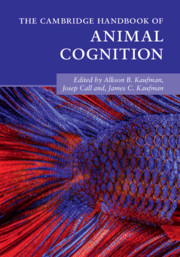Book contents
- The Cambridge Handbook of Animal Cognition
- The Cambridge Handbook of Animal Cognition
- Copyright page
- Dedication
- Contents
- Figures, Tables, and Boxes
- Contributors
- Acknowledgments
- Introduction
- Part I Communication and Language
- Part II Memory and Recall
- Part III Social Cognition
- 11 Social Cognition Overview
- 12 Proximate and Ultimate Mechanisms of Cooperation in Fishes
- 13 Evolutionary and Neural Bases of the Sense of Animacy
- 14 Raven Social Cognition and Behavior
- 15 Reciprocal cooperation – Norway rats (Rattus norvegicus) as an example
- 16 Exploring the Social Minds of Elephants
- 17 Dolphin Social Cognition
- 18 Mirror Self-Recognition
- Part IV Social Learning and Teaching
- Part V Numerical and Quantitative Abilities
- Part VI Innovation and Problem-Solving
- Index
- References
13 - Evolutionary and Neural Bases of the Sense of Animacy
from Part III - Social Cognition
Published online by Cambridge University Press: 01 July 2021
- The Cambridge Handbook of Animal Cognition
- The Cambridge Handbook of Animal Cognition
- Copyright page
- Dedication
- Contents
- Figures, Tables, and Boxes
- Contributors
- Acknowledgments
- Introduction
- Part I Communication and Language
- Part II Memory and Recall
- Part III Social Cognition
- 11 Social Cognition Overview
- 12 Proximate and Ultimate Mechanisms of Cooperation in Fishes
- 13 Evolutionary and Neural Bases of the Sense of Animacy
- 14 Raven Social Cognition and Behavior
- 15 Reciprocal cooperation – Norway rats (Rattus norvegicus) as an example
- 16 Exploring the Social Minds of Elephants
- 17 Dolphin Social Cognition
- 18 Mirror Self-Recognition
- Part IV Social Learning and Teaching
- Part V Numerical and Quantitative Abilities
- Part VI Innovation and Problem-Solving
- Index
- References
Summary
A crucial skill for survival among animals is distinguishing between living and non-living entities, be those predators, social companions, or prey. Animacy is the perceived property of an object to be animate. Therefore, animals should possess fast unlearnt mechanisms for the detection of animacy. If, for instance, primates would rely on learning to avoid venomous snakes, they would probably die at the first encounter. If chicks would imprint on the first object seen immediately after hatching, they would frequently end up imprinting on an eggshell. It is thus likely that selective pressures shaped an adaptive set of unlearnt rudimental knowledge, shared among species. This knowledge helps them to tell apart, in an otherwise undifferentiated sensory world, animate from inanimate objects. Further learning would capitalize on this rudimental, original knowledge and shape more sophisticated cognitive abilities and behaviors (Vallortigara, 2009, 2012b, 2012a; Versace, Martinho-Truswell, Kacelnik, & Vallortigara, 2018). Some configurations of features and movements help animals to disentangle between animate and inanimate objects. The present chapter will thus discuss behavioural evidence and suggested neural mechanisms underlying the detection of static and dynamic cues to animacy in the various species with particular emphasis on their ontogenetic development.
- Type
- Chapter
- Information
- The Cambridge Handbook of Animal Cognition , pp. 295 - 321Publisher: Cambridge University PressPrint publication year: 2021
References
- 15
- Cited by

